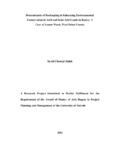| dc.description.abstract | The main purpose of this study was to assess the determinants of beekeeping as an alternative economic activity in enhancing environmental conservation in arid and semi-arid lands in Kenya, a case of Lomut ward West Pokot County, Kenya which is categorized as ASAL and this activity has been practiced in the region for some time. The study was guided by the following research objectives; to determine the effects of afforestation for bee keeping on environmental conservation, to assess how protection of water catchment areas for bee keeping purposes affect environmental conservation, to investigate how intercropping influence environmental conservation and to find how technology adoption for bee keeping influence environmental conservation. In this research, survey study research design was used. This study targeted 220 respondents and a sample size of 136 was then selected. Purposive sampling was used to select CABESI officials operating in the region and simple random sampling was used to select 126 community residents. Questionnaires and interview schedules were used to collect primary data. The study used descriptive and inferential statistics as the main methods of data analysis. The analysis and presentation of data focused on the frequencies, percentage and tables. The study will benefit the general public from the conserved environment and the biodiversity of wildlife, various bodies of the government and NGOs in line with the achievement of vision 2030, which seeks to enable the transition of small scale farms and improving the living standards of people in arid and semi-arid regions and form a useful foundation upon which future studies can be undertaken by other researchers taking into account the suggestions for further studies. The study found that bee keeping encourages planting of trees which encourages conservation of the environment, rivers and springs have been protected for environmental conservation by bee keepers, that bee keeping has contributed a lot to pollination of flowering plants, intercropping, adoption of modern bee hives, modern apiary management and adoption of modern honey harvesting methods. The study recommends that the addition of a little technical information on the existing however, can lead to greatly improved methods of carrying out the activity for environmental conservation, the Government through the ministry of environment, water and natural resources should set to improve the practice by planting trees and encouraging the locals to practice afforestation, the government through the ministry of sports, culture and the arts should intervene in the gender biasness in this region. Women in the area should be empowered to participate in every economic activity just like the men. Taboos and traditional beliefs discouraging women from bee keeping should be scrapped off, development partners should facilitate the involvement of women in beekeeping activities in the study area. Development partners should fund research to ascertain ways of improving harvesting and marketing of bee products to enhance their quality and quantity | en_US |

